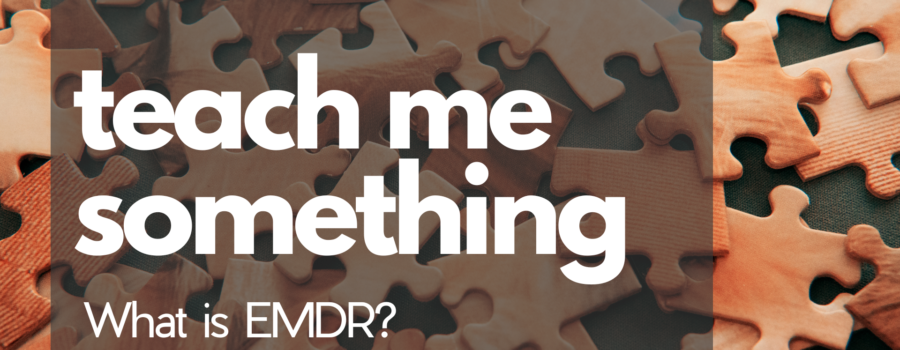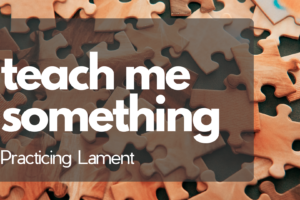This is a question I often get from people who are not familiar with counseling or the language we commonly use as counselors. As a counselor, one would think that we could just easily explain what we do every single day in a way that anyone could understand. However, that is not where I find myself often when I am sitting across from a curious friend or a client in need of treatment. There are intricacies that color such a beautiful approach to healing that deserve some air time to be understood. EMDR is one of those pieces of revealed knowledge from our Creator that offers help in the midst of our suffering this side of Heaven.
In its simplest explanation, EMDR is essentially a model of therapy in which the clinician asks you to recall a disturbing memory, then they wave their fingers in front of your face as you follow along with your eyes and you begin to feel better rather quickly. Kooky, right? Sound like black magic? Or a gimmick for someone to take your money? Or even like we have adapted something like hypnosis to be a little more socially acceptable for the current day? These initial perceptions are unfaithful to the model and what it actually is, though they make sense as conclusions in which an outsider looking in might make.
EMDR is complex in its neurological functioning, standardized in its procedure, and holds the most empirical support when compared to other forms of psychotherapy. This acronym I keep tossing out there stands for Eye Movement Desensitization and Reprocessing, a model of therapy counselors use to treat a wide array of problems people face in their mind and body. There is a lot to be said about how EMDR is useful and what benefits it can offer those seeking counseling and healing. However, I will do my best to focus here on what the model itself is and how it works.
Just like all models of therapy, EMDR is based on a theory that has been researched and proven effective as a working theory. The theory that EMDR is based on has largely to do with the Adaptive Information Processing System (AIP) in your brain. If you are interested in this, here is another blog about what the AIP is. In short, EMDR works by activating your AIP in order to help move or digest information stored as stress in your brain to a more functional area in which it can be accessed as helpful information.
We do this through what we call Dual Attention Stimulation (DAS) or Bilateral Stimulation (BLS). This is where finger wagging comes into play. The clinician uses the mechanisms in your eyes that are naturally active during a stage of sleep called Rapid Eye Movement (REM). Now, every night that you get healthy sleep, your brain goes hard to work at sorting and digesting all the information you took in that day through your senses. You go through a few different stages of sleep in cycles all through the night. REM sleep is kind of like hyperdrive for your brain’s processing and your eyes are just as active as they quite literally move rapidly in their sockets. EMDR mimics this exact same level of processing with specific information while you are awake. Essentially, an EMDR therapist taps into how God has already designed your brain and uses it to help you make sense of something that your brain was not able to do on its own, likely due to being overwhelmed.
Finger wagging is not always necessary, as there are a few other types of DAS that we might use to activate this processing system in your brain. Some therapists use light bars, where you follow a light with your eyes, while others use a form of tactile stimulation like having you hold a set of tappers that vibrate in each hand. Some counselors might even ask your permission to tap the tops of your hands or the outside of your knees or ankles with their fingers in order to provide the bilateral stimulation your brain needs.
The D in DAS stands for dual, meaning we are essentially tricking your brain to hold attention on two different things at one time. Fingers, lights, or tappers are one form and the other comes from within the client receiving the therapy: their memory. The clinician will ask the client to identify and recall a memory that causes disturbance in the present that they might wish they “could just get over” or “not be so bothered by this thing that I know is over, but it keeps popping up out of nowhere”.
Your memory has different components that may show up as you re-member that which you have experienced. These different aspects of memory are thoughts, images, beliefs, emotions, and sensations in your body. The most beautiful thing in EMDR is that your brain knows what to do and how to reorder these aspects of memory into adaptive information. For the Christian, this is evidence of God’s intelligent design and direct working and presence with us in all things, including counseling. We believe that God has offered us this insight in order to know Him, glorify that which He has done, and have the freedom to live life to the fullest. In the counseling room, all you have to do is notice what you are noticing and see how your brain and body gain peace in the process.
As a counselor that uses EMDR as my main modality of counseling, the greatest point I know to make when people ask about EMDR is that this model is a great gift from God that has the potential to bring help and lay the groundwork for healing for many. It is a procedure in which the Holy Spirit is near and active, reknitting that which has been damaged by sin. EMDR is an avenue for people to stand at the crossroads of maladaptive memory and restoration, knowing that it is the work of God that brings true healing.






Recent Comments